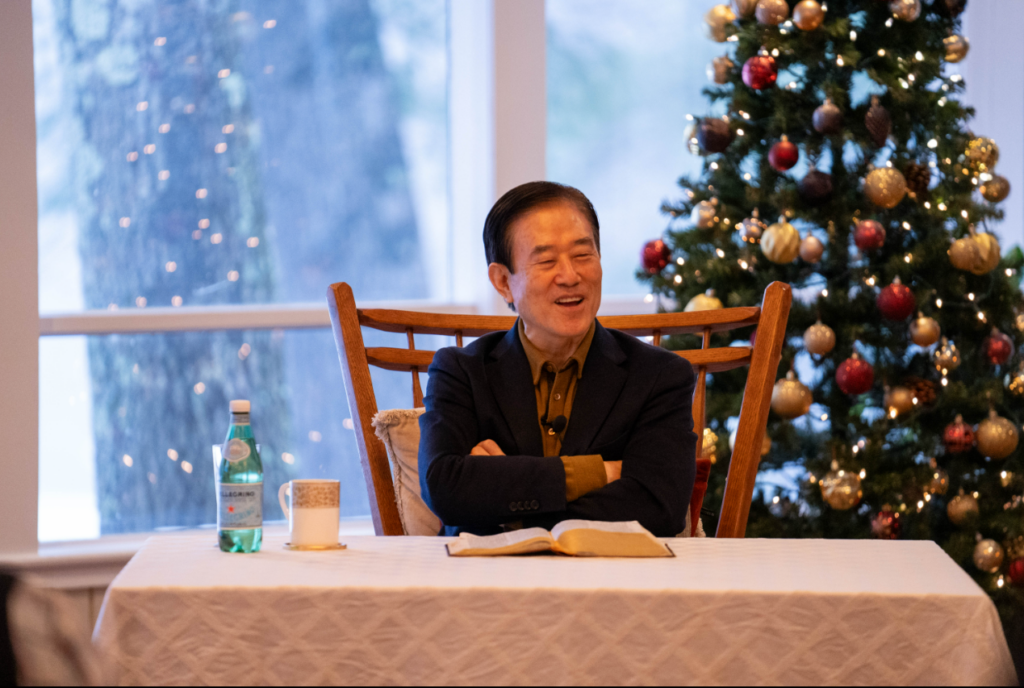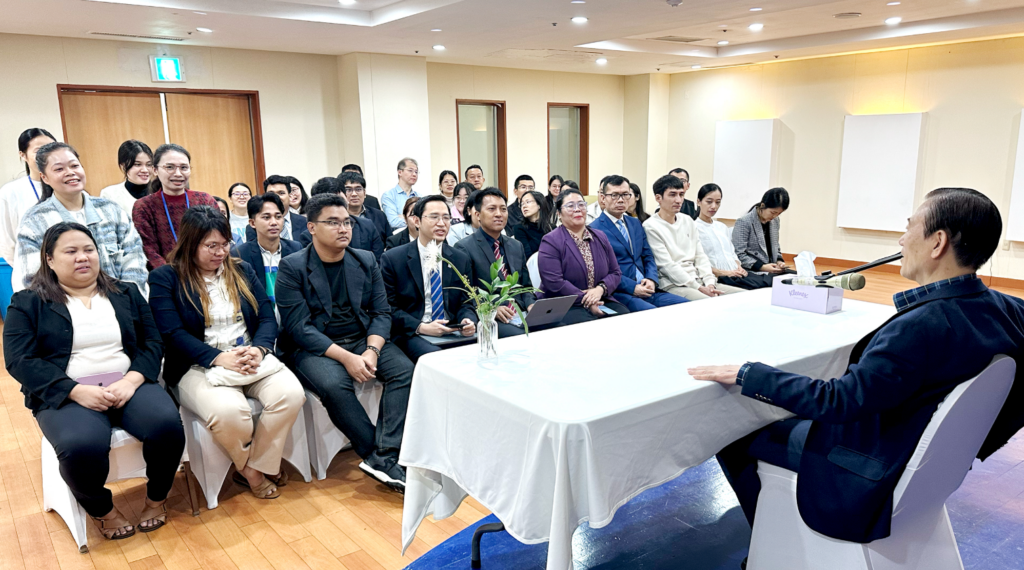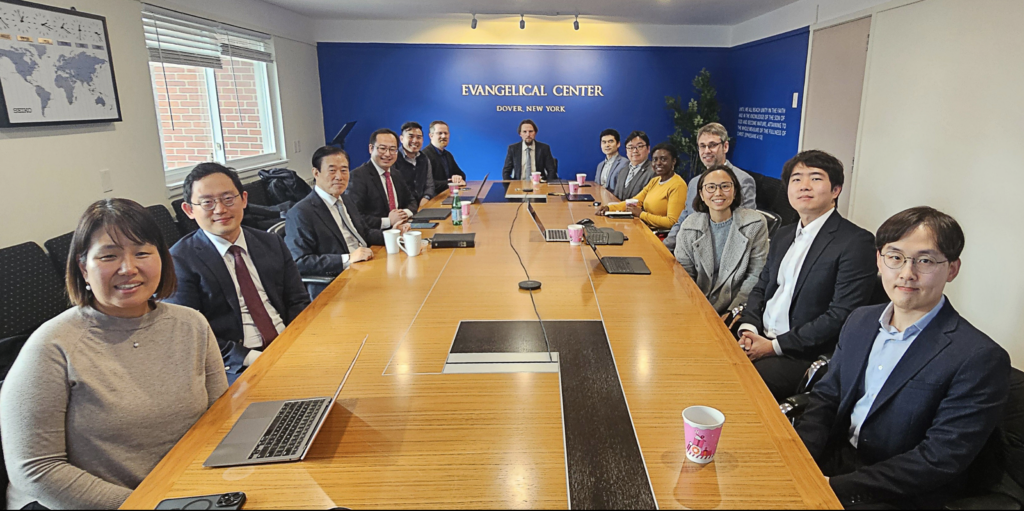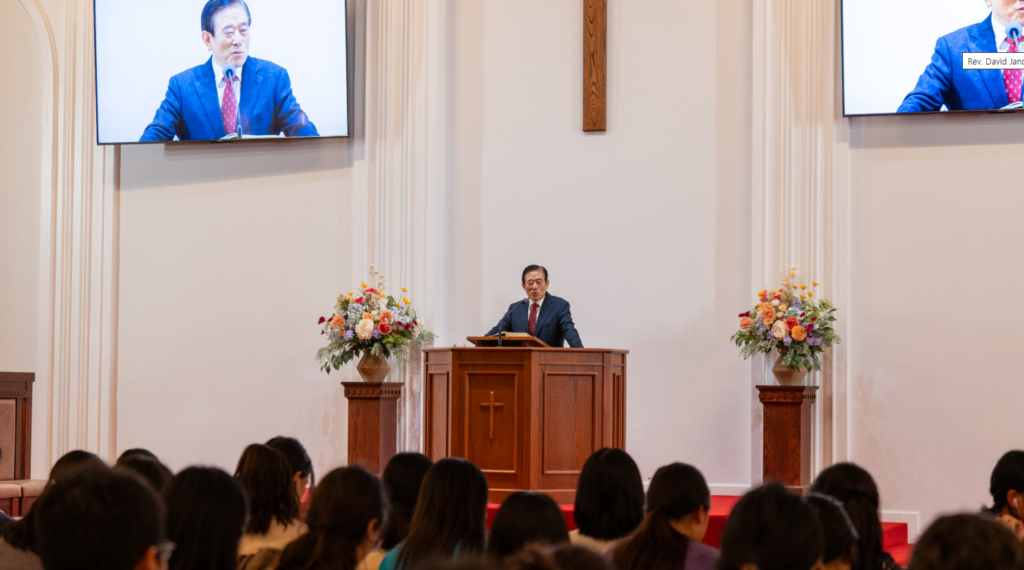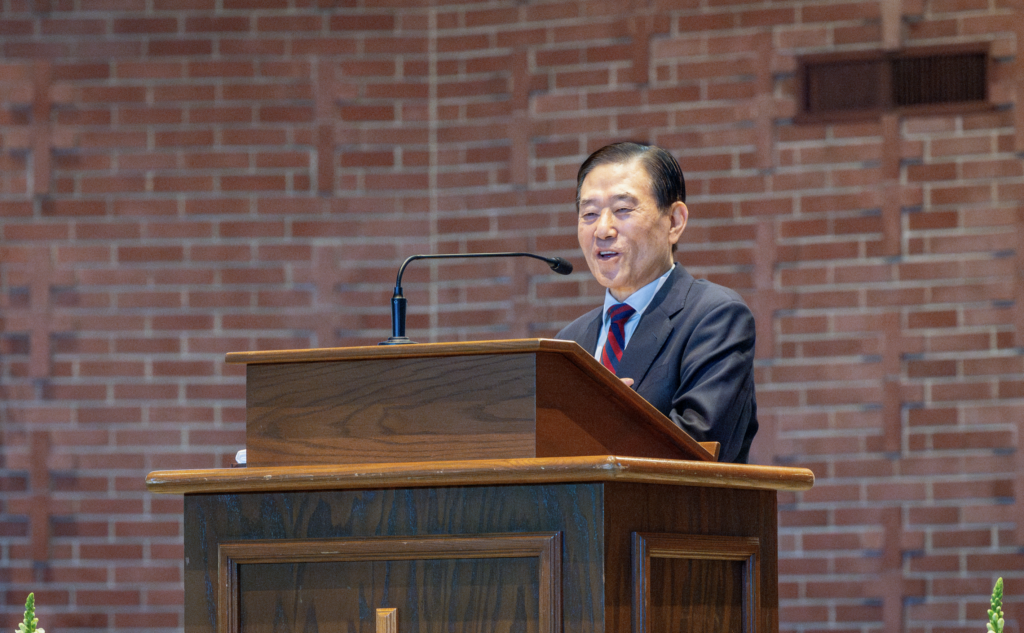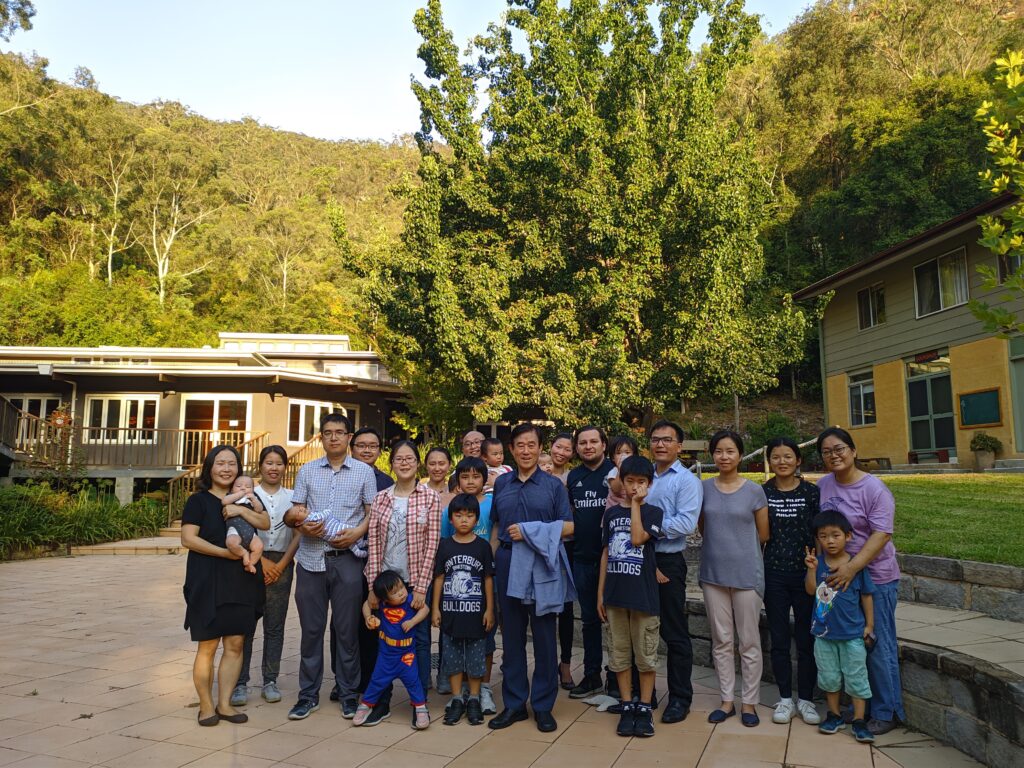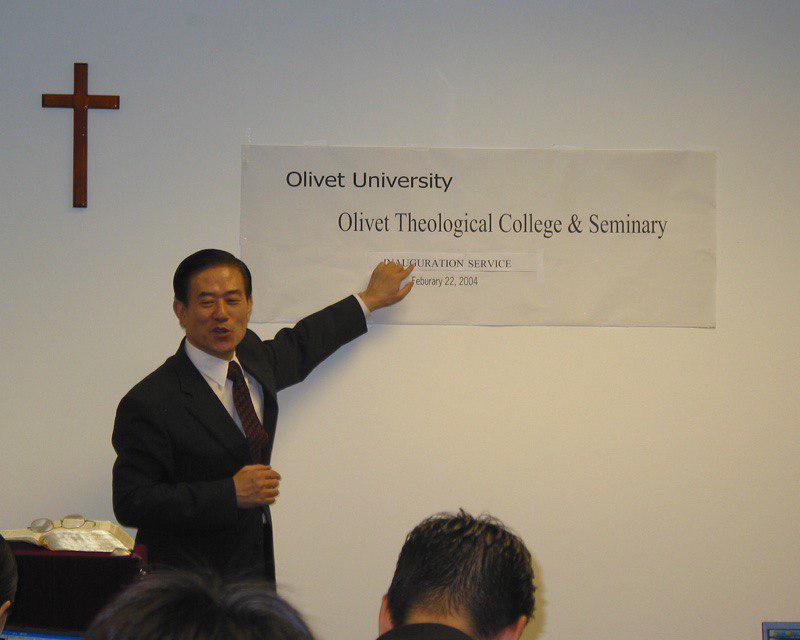
1. The Coming of Jesus Christ
Pastor David Jang has dedicated many years to studying the Gospels, paying particular attention to Matthew chapter 2, which recounts the birth of Jesus Christ and illuminates the manner in which “the Son of God comes.” One of the central themes he stresses is the concept of the “collision between the ‘already’ and the ‘not yet.’” In Matthew 2, we see Gentile Magi—foreigners—who recognize through the sign of a star that the Messiah has “already” been born. They rejoice, worship, and honor Him. Yet paradoxically, the Jewish religious establishment—chief priests, scribes, and the like—remain convinced that the Messiah has “not yet” arrived. Pastor David Jang explores this scene, highlighting both the pitfalls the modern church may fall into and the hope it must cling to.
He first delves into why the chief priests and scribes of Judea did not accept the Messiah’s “already” coming. They were strongly influenced by passages like Daniel 7:13 (“One like a son of man came with the clouds of heaven and approached the Ancient of Days…”), as well as the prophecy in Isaiah 66:15-16 concerning God’s day arriving in “chariots of fire” and “fierce flames,” which loomed large in their expectations. Furthermore, as Pastor David Jang often mentions, they placed such a strong emphasis on the Messiah as a “King of glory coming on the clouds,” heralded by the trumpet blast of the archangel—an intensely regal manifestation of divine kingship—that they completely missed the Messiah who was actually born in a humble manger.
Because the religious leaders would not abandon their sense of ethnic privilege and let go of their firmly held expectation of a “majestic Messiah,” they could not readily believe the Magi’s report that the Messiah had “already” come. Pastor David Jang interprets this as “a tragedy brought about by human limitations—eyes that looked only to the lofty.” Indeed, in Matthew 2:4-6, when King Herod asks, “Where is the Christ to be born?” the chief priests and scribes eventually consult Micah 5:2 (“But you, Bethlehem Ephrathah, though you are small among the clans of Judah…”). Only then did they realize there was a prophecy from the Minor Prophets that the Messiah would come from the small town of Bethlehem, taking “the lowest place.” Pastor David Jang underscores that they had “failed to notice the prophecy in Micah 5:2 about the Messiah who would come in humility and self-emptying.”
From this point, Pastor David Jang highlights several key lessons for the contemporary church. First, if the church becomes too consumed with “splendor and success,” it risks overlooking the image of Jesus Christ who comes to the lowly places. Even though the “majestic Messiah” depicted in the Major Prophets was already recorded in the Old Testament, if we fail to see the message in the Minor Prophets that the Messiah would come humbly, we may struggle to participate in God’s redemptive work. Second, the path Jesus walked is one of “humility” and “self-emptying.” It was Gentiles who flocked to worship the baby Jesus, lying in a manger. Those who prided themselves as God’s chosen people ironically sided with King Herod—who held to a “not yet” mindset—and sought to kill the Messiah.
Moving on to the scene where the Magi present gifts of “gold, frankincense, and myrrh” (Matthew 2:11), Pastor David Jang teaches that these three gifts symbolize the threefold office of Christ. Gold represents the authority of a king and his eternal, unchanging kingship. Frankincense points to the priestly role, for incense in the Old Testament offerings signified the holiness of God and was associated with the high priest’s ministry. Myrrh, a fragrance used in burial rites at the time, foreshadows the defeat of death and the reality of “resurrection” and “eternal life.” Thus, Pastor David Jang underscores that within the gifts of the Magi lie profound symbols of the gospel—Christ as King, Christ as High Priest, and Christ as the One who ultimately overcomes death.
However, Matthew 2 does not end there. Once Herod realizes he has been deceived by the Magi, he orders the horrifying massacre of all male children under two years old in the vicinity of Bethlehem (Matthew 2:16). Pastor David Jang uses this passage to illustrate that “evil never remains idle; when the true King arrives, the false king grows fearful.” One of his favorite illustrative analogies goes like this: “Someone sitting in a train seat without a proper ticket panics when the rightful seat owner appears and tries desperately to kick him off.” The point is that worldly rulers and evil powers are effectively freeloaders, and when the rightful Owner, Christ, arrives, they will fight tooth and nail to reject Him.
This parallels the event in Exodus when the Egyptian Pharaoh attempted to kill every Hebrew baby boy at the time of Moses’s birth. Pastor David Jang explains that “Satan has feared God’s people from the beginning and always sought to kill them.” Yet the Hebrew midwives in Exodus, driven by their fear of the Lord and resourcefulness, saved the babies (Exodus 1:20-21), preventing God’s redemptive history from being cut off. Similarly, in the birth story of Jesus, Joseph, following God’s instructions, flees to Egypt with the infant Jesus (Matthew 2:13-15), preserving the life of the Messiah.
When preaching on these passages, Pastor David Jang often refers to this effort as “the fierce struggle to carry on the story.” From the moment Jesus arrived in this world, far from being welcomed, He was pursued by worldly authorities and threatened by slaughter. Nevertheless, God’s plan was not thwarted. The Savior who had come to earth needed to survive. To that end, Joseph and Mary responded swiftly and faithfully, shouldering the burden of a “flight” to safety. Finally, after Herod dies, Jesus is able to return to the land of Israel (Matthew 2:19-21). Although more dangers remain, another dream warns them (Matthew 2:22), leading them to the region of Galilee, where Jesus grows up in Nazareth.
Pastor David Jang emphasizes the significance of this place called “Nazareth.” He points out that the Hebrew word for “branch,” netzer (NZR), appears in Isaiah 11:1 (“A shoot will come up from the stump of Jesse; from his roots a Branch will bear fruit.”). He explains that Jesus’ eventual residence in Nazareth (NaZaReth) in Galilee symbolically fulfills the prophecy that “the Messiah, as a descendant of David, emerges as the ‘Branch’ from the root of Jesse.” Hence Matthew 2:23: “So was fulfilled what was said through the prophets, that he would be called a Nazarene.”
From the entirety of Matthew 2, Pastor David Jang draws the following lessons. First, the Messiah came from an unexpected, lowly place. Second, counterfeit rulers always fear and reject the true King. Third, God never allows His redemptive plan to be cut short. Through the Magi, through the faith and obedience of Joseph and Mary, and through the prophecies of Isaiah, Micah, and Jeremiah, God ultimately fulfills the Messiah’s coming in humility. Fourth, we too must possess “the wisdom to obey the Word” and “a humble faith.” Specifically, Pastor David Jang warns that if the church overlooks serving the powerless and the lowly, it risks becoming like the chief priests and scribes of history—failing to recognize the Lord’s presence in the humble places.
Thus, Pastor David Jang does not treat Matthew 2 merely as a “Christmas narrative,” but as a monumental chapter of spiritual warfare and the outworking of God’s salvation plan. Simultaneously, he cautions that if our gaze fixates on vanity and worldly power, we may fail to see “the little town of Bethlehem” or “Jesus, who did not cling to His equality with God.” For him, the gospel is not solely about the Cross and the Resurrection, but a comprehensive truth that includes the Incarnation (the birth) all the way to the Ascension. Understanding the birth story properly, he believes, is crucial for fully grasping the gospel.
This teaching has resonated powerfully in church settings today, primarily because modern society prizes “success,” “prosperity,” and “power” so highly. Many believers are easily captivated by “grand and magnificent things.” Yet the Savior actually chose the smallest town and the meager surroundings of a manger. Pastor David Jang refers to this as “God’s upside-down value system.” While the world aspires to ascend ever higher, Christ came down to the lowest place. The world chases after greater wealth and recognition, but Christ emptied Himself of glory, taking on the nature of a servant. And paradoxically, through that path, He opened the way to salvation and eternal life for all humanity.
Pastor David Jang observes that the Magi could find the infant Jesus by following the star because of their “pure desire and God’s guidance.” Although they were outsiders to the Jewish tradition, they harbored a deep longing for truth, and they received God’s revelation through the universal sign of the star. Moreover, they obeyed God’s leading rather than the king’s, returning home by a different route (Matthew 2:12). Pastor David Jang interprets this as “a scene in which foreigners exemplify genuine obedience.” He explains that “regardless of religious background or social status, those who remain open to God’s will eventually encounter Jesus Christ.”
In summary, Pastor David Jang’s core message from Matthew 2 is the significance of the Incarnation—God entering our sin-filled world in “the lowest way”—and how every human heart’s response to that humility determines our place in salvation’s story. He encapsulates the main theme of this chapter as “the Most High coming to the most lowly.” Though it often defies our expectation of a “splendid salvation,” that very fact is the glory of the gospel and the mystery of humanity’s redemption. Those who missed it—be they religious leaders or powerful rulers—became enemies of the Messiah, a lesson for all to ponder.
This insight serves as a basis for Pastor David Jang’s call for repentance and renewal in modern churches and among believers. Time and again, he asks, “Do we truly rejoice in the coming of Jesus Christ, or are we fixated on worldly success and power, longing only for the ‘King of glory’ in one dimension?” He then appeals to his hearers: if you truly want to follow the gospel, deeply meditate on Matthew 2’s message of humility.
2. The Mystery of the Incarnation
Pastor David Jang explains that while one could summarize the gospel with the words “the Cross and the Resurrection,” that alone is insufficient. For him, the gospel is a complete narrative—encompassing the Incarnation (birth), suffering, the Cross, the Resurrection, and finally the Ascension. The declaration, “The Word became flesh and made his dwelling among us…” (John 1:14), shows that the birth of Jesus Christ is not merely a birth story but rather the colossal event of the eternal Word “breaking into” our sinful world. This is why Pastor David Jang calls Christmas “both the most fundamental and the most central season for meditating on the coming of Jesus Christ.”
He weaves together John 1:1 (“In the beginning was the Word…”), 1 John 1:1 (“…which we have heard, which we have seen with our eyes, which we have looked at and our hands have touched…”), and Paul’s confession in Philippians 2:7 (“He made himself nothing, taking the very nature of a servant, being made in human likeness”) to convey the full significance of the Son of God becoming incarnate in the world. Particularly in Philippians 2, where Paul discusses the kenosis (self-emptying) of Jesus, Pastor David Jang emphasizes that Christ’s refusal to cling to equality with God, His “lowering of Himself,” forms the starting point of the gospel. Had Jesus come to earth in the most majestic and terrifying manner—like a ruler imposing His will—He would likely have been received not with love but with terror and forced compliance. Yet Jesus was born in a stable, grew up as an ordinary Galilean, and personally experienced humanity’s suffering and limitations.
Pastor David Jang contends that this is what proves Christianity is not merely an abstract or metaphysical religion but one that fully participates in the real suffering and hardship of human life—a “religion of love.” Each Christmas, he urges believers to ask, “Does our faith truly serve humbly in the lowly places?” Because as churches expand, grow financially, and take pride in large congregations, they risk losing sight of the baby Jesus lying in a manger.
In preaching on God’s love through the Incarnation, Pastor David Jang frequently cites 1 John 4:9: “God sent His one and only Son into the world that we might live through him.” The very fact that God personally entered a world full of sin and suffering is the key to salvation. The Cross represents the ultimate demonstration of this love, and the Resurrection declares that this love has triumphed even over death. Pastor David Jang, however, goes a step further, insisting that we also incorporate the importance of the “Ascension.” If we neglect the fact that Christ, having conquered death and risen, ascended in full glory to heaven, then the Christian faith risks confining itself purely to this earthly realm, distorting our understanding of the era of the Holy Spirit and the mission of the church.
In Matthew 28, the risen Jesus issues what is known as the Great Commission (“Go and make disciples of all nations…,” Matthew 28:19-20). Then in Acts 1, He ascends to heaven before the disciples’ eyes (Acts 1:9). Pastor David Jang explains that “the history of salvation that began on earth—set in motion by the Incarnation—ultimately expands universally through the presence of the Holy Spirit.” In this unfolding, the church proclaims the gospel to the world in the name of “Jesus of Nazareth.” The fact that “Nazareth” connotes obscurity and humility, yet paradoxically magnifies God’s glory, lies at the heart of Pastor David Jang’s insight.
He laments that modern believers often say, “I understand the Cross and the Resurrection, but the birth and the Ascension are just Christmas festivities or a brief note after Easter.” Yet to have a complete gospel, he asserts, we must grasp that “the Cross and Resurrection gain depth of meaning through the Incarnation (birth) and the Ascension.” Because the Word truly “became flesh” and led a fully human life, the suffering on the Cross was not just a “divine performance,” but an act of God fully sharing in and redeeming humanity’s every pain. Likewise, without the Ascension, the Resurrection could be reduced to the mere story of a moral teacher—devoid of the final vindication that Christ is truly Lord and King. Consequently, the church might fail to comprehend its mission to herald salvation throughout the world via the Holy Spirit.
Insisting that believers comprehend the entire life and ministry of Jesus—from “birth and suffering” to “the Cross and Resurrection” and “the Ascension”—Pastor David Jang aims to prevent Christians from fragmenting the gospel and knowing it only in part. Without the Incarnation, the significance of Jesus’s suffering might lose its authenticity regarding human pain. Without teaching the Ascension, the church might fail to proclaim Christ’s ultimate glory and divine kingship.
In his sermons, Pastor David Jang frequently ties these doctrines to concrete applications. First, he encourages believers to engage in outreach to “the poor and the marginalized” at Christmas. Since the Incarnation began “not in a high place but in a lowly manger,” he urges churches to start their acts of love from the bottom up. Second, beyond merely celebrating Easter, he urges that we continue living as witnesses to the “risen Lord.” Easter is not the end but a “new beginning,” reminding us that the living Christ is still at work. Third, we must not forget the significance of the Ascension. Because Jesus has completely conquered and ascended to the right hand of God, the church need not lose heart; rather, we hope for “the Second Coming,” receiving the Holy Spirit and being sent out as Christ’s emissaries in this world.
Pastor David Jang also reinterprets the “already and not yet” of the Kingdom of God through the lens of the Incarnation, the Cross, the Resurrection, and the Ascension. “With Christ’s coming into this world, God’s Kingdom has already arrived. Yet it has not been fully consummated,” he says. Hence, the church must rejoice in the Kingdom that has already begun while also longing for its ultimate fulfillment at the Lord’s return. If we lose this tension, our faith may devolve into either an otherworldly “romantic consolation” or a purely worldly quest for success—both forms of corruption.
Ultimately, Pastor David Jang declares that every believer must resemble “the incarnate Truth and Love,” Jesus. If the church chases after earthly wealth and power while misunderstanding the kingship of the “already present Messiah,” it is no different from Herod. Indeed, the same scenario that unfolded during the birth of Jesus—with worldly kings and religious elites seeking to “kill the Messiah who had already come”—can repeat itself today. Thus, we must rightly understand the gospel of Jesus Christ, taking hold of the astonishing truths of His Incarnation, Cross, Resurrection, and Ascension.
As Pastor David Jang frequently reminds, “The gospel is love and life.” That love is revealed through the self-emptying of the baby Jesus, and that life is unveiled in the Resurrection and Ascension, which conquer death. In order for the church to walk on this path of love and life, it must continually fix its gaze on “the Son of God who came to the lowly place,” recognizing that the journey will not be easy. The forces of evil in this world will not yield quietly, as seen in Matthew 2. Like Herod, satanic powers persistently reject Jesus Christ and threaten believers. Hence, the church must stand together in unity and seek the wisdom of God—the reverential fear of the Lord and the power to discern evil—Pastor David Jang reiterates.
In this sense, Pastor David Jang’s message is far more than a simple “Let’s believe in Jesus.” It is a deep question: “Do you truly know Jesus? Are you ready to understand His birth, life, death, Resurrection, and Ascension, and follow in that path?” To respond effectively, we must view Matthew 2’s paradox of humility, the Incarnation’s love, the Cross and Resurrection’s redemptive power, and the Ascension’s proclamation of Christ’s kingship and future return in a unified, holistic light.
Pastor David Jang describes the meaning of Christmas as “the event in which God’s love descended to the very depths of human life.” Without the Incarnation, the Cross would be incomplete; without the Cross, the Resurrection would be merely a surface-level miracle; and without the Ascension, the Resurrection could be dismissed as an event trapped in this temporal realm. Hence, he presents the entire life of Jesus Christ, from birth to Ascension, as a single “body of the gospel.” Within this overarching narrative, believers learn humility and obedience, behold divine love reaching the lowliest corners of existence, and simultaneously proclaim the power that overcomes death as well as the universal lordship of Jesus Christ.
Pastor David Jang constantly urges that if we desire to truly proclaim the gospel, “we must present to everyone—both inside and outside the church—the whole framework of the Incarnation, the Cross, the Resurrection, and the Ascension.” He begins with Matthew 2 because it so vividly depicts how Jesus did not start off “regally pampered” but instead was pursued by a wicked king, fleeing as a refugee to Egypt. This, he says, underscores the paradoxical truth of the gospel: a universal salvation event penetrating human history—a great reversal authored by God. Often, we imagine the “Prince of Peace” being welcomed in a grand temple ceremony, radiating glory. Yet in reality, the gospel shows Jesus as a servant who humbled Himself to the extreme. Born in a manger, befriending the poor and oppressed, He was ultimately crucified under worldly powers. But by His Resurrection and Ascension, He triumphed over sin and death. According to Pastor David Jang, this is truly a “cosmic gospel,” revealing how God Himself intervened in a sin-stained human story and overturned it.
Such a message speaks powerfully to modern evangelism and church ministry. Without social outreach to the marginalized or ministry that touches people’s pain and injustice, we cannot truly pass on the spirit of Jesus’s birth. At the same time, if we fail to preach the supreme love of God embodied by the Cross and instead focus on mere moral teachings, that is no gospel at all. Moreover, if we ignore the Resurrection and Ascension—where Christ reigns as King—we risk reducing Christianity to just another “movement” limited to this world.
Therefore, Pastor David Jang’s single overarching counsel is this: “Let us not know the gospel only in fragments, but see Jesus in His fullness.” Let our lives continue the awe of the Incarnation, and let us walk in a way that honors God’s descent into the lowliest places. From the humble little town of Nazareth, God’s story has spread to churches and believers worldwide. Even now, Pastor David Jang opens Matthew 2 and proclaims, “The Messiah has already come and is still working among us. We must remember His humble path, worship Him, love our neighbors, and declare the truth in the world.” This comprehensive perspective—from the Incarnation to the Ascension—is the core of the Christian gospel that Pastor David Jang has consistently upheld and taught.
